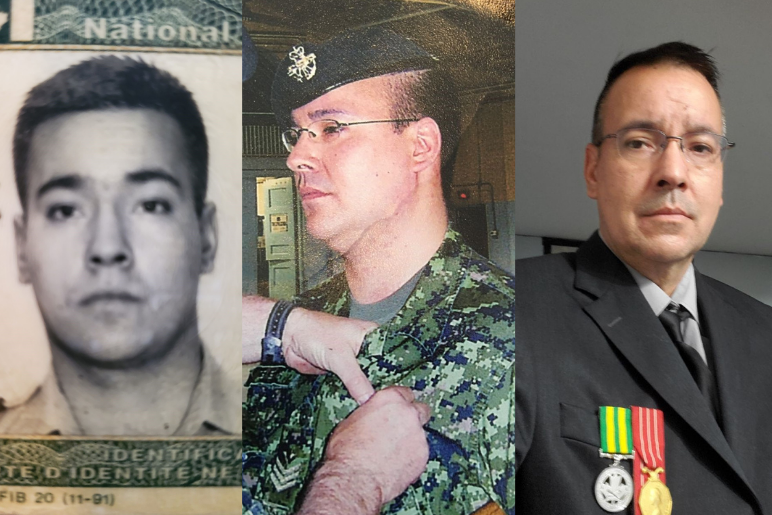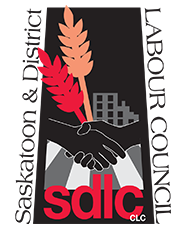November 8 is Indigenous Veterans Day across Canada, a day to recognize the contribution and sacrifice of 23,000 First Nations and Métis veterans who have served in the Canadian Armed Forces. Today, more than 2,700 Indigenous service members continue that legacy.
Among those thousands is Sgt. J.A. Demerais, C.D. (Ret.). A Métis veteran from Prince Albert, who served in the armed forces for 17 years, starting in 1990. He’s also a former SGEU member.
Demerais made the decision to join the armed forces at the age of 17. “A couple of buddies walked up to me in the hallways of Carleton [Comprehensive High School],” he recounted. He said his friends told him, “You get to shoot rifles, you get paid for it, and you get to travel the world.”
Demerais was immediately sold: “I went down, signed the papers.”
When his first day of basic training rolled around, it came as a shock.
“You’re standing at attention for an hour in the morning, or you’re marching around, in 40-degree heat, on parade square. You’re getting yelled at.”
“You hop off the panel van.” Desmarias recalled his first day of basic training. “They yell at you to form up. You don’t know what the hell ‘forming up’ is.
“But they’re yelling at you to form up in three ranks. You’re doing the duffle bag shuffle. So, you have a rucksack over the top of your back that weighs probably 110 pounds. And then you have a duffle bag that weighs another 60 pounds of all your stuff. Then they yell at you for marching: ‘left, right, left, right’. You have no clue what you’re doing.”
Training did not get any easier for Demarais. “You’re standing at attention for an hour in the morning, or you’re marching around, in 40-degree heat, on parade square. You’re getting yelled at.”
Demerais said he now understands why they put him through these rigours: “Essentially, your basic training is to break down individualism and build everyone back up as a team. It’s nothing personal. You want all the troops to do the absolute best they can, because they are your teammates.”
"...not once did the colour of my skin or my spirituality differ from what the person next to me did.”
In the face of this adversity, Demerais made close friendships. “That sticks with a person forever. All those people that went through all those hardships. You don’t forget those guys that built you into the man that you become.”
Emerging from training, Demerais didn’t feel separated from his fellow troops as a Métis man. “It didn’t matter about skin colour, race, anything else. We’re all one. We all had one common goal. We wanted to be patriotic.”
“There were certain chats that might be deemed politically incorrect,” Demerais recalls. “But not once did the colour of my skin or my spirituality differ from what the person next to me did.”
Demerais emerged from basic training and took numerous advanced courses before being sent to the Arctic. He participated in efforts by Canada and other NATO countries in reaffirming their sovereignty in the far north.
“That was probably the first time I realized that none of this shit was a game anymore,” Demerais recalled from a stint in Norway. “Our team partner and I dug up some really thick moss and whatever else and found old 59 rimmed [munition] rounds there. We start realizing: ‘Hey, we’re not bulletproof.’”
Injuries in the Armed Forces began to add up. Demerais found a new opportunity to work in correctional institutions in Saskatchewan. He became an SGEU member and worked in the public sector until 2023.
Shortly after his time in basic training, a program called “Bold Eagle” was developed and offered to Indigenous young adults interested in serving in the Armed Forces. “I had the honour of being a driver on the first ever Bold Eagle platoon that happened in Prince Albert, Saskatchewan.
“It took a bunch of individuals that were native individuals and pulled them away from the different areas of the province and brought them to do a basic training. Basically, it was opening it up from a small, narrow window to a larger window.
“Absolutely fantastic courses,” Demerais said of the program, which still runs today.
“There’s no person in the army that can do it by themselves. They need a team."
With so much that segregates society based on race, religion, class, and other factors, Demerais says the military taught unity. “We were a team.”
“There are shitty people, no matter what colour, race, religion, everything else. And not every fire team partner I had, I got along with. But we still had to do a job.
“There’s no person in the army that can do it by themselves. They need a team.
“I’m Sargeant J.A. Demerais, C.D. That’s all I’m known by. I’m not known by Métis sergeant or anything else. Everything was off my merit. If I did good, I knew I did good. It didn’t matter what colour my skin was.’






